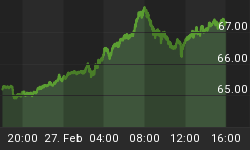The following is part of Pivotal Events that was published for our subscribers Thursday, March 19, 2009.
SIGNS OF THE TIMES:
Last Year:
"UCLA Economics Forecast"
"We don't see [a recession] happening. This is tough call, but I will be very surprised if this actually precipitates into a recession."
- AP, March 11, 2008
"So Congress tried to make sure it [The Depression] would never happen again by creating a system of regulation and guarantees that provide a safety net for the financial system."
- Nobel winner, Paul Krugman, New York Times, March 21, 2008
"Banks are particularly attractive - will lead us out of the doldrums."
- Matrix Asset Management, Business News Network, March 28, 2008
"Most banks are a 'Widows and Orphans' short."
- Institutional Advisors, July, 2007
* * * * *
This Year:
"Jim Rogers said that the Federal Reserve will probably start buying treasuries to keep borrowing costs down, postponing a disaster in U.S. Government bonds."
- Bloomberg, March 9, 2009
This observation is so naïve as to be almost Zen-like. History provides many outstanding examples of unintended consequences, but one of the biggest involves simple arithmetic and government ambition.
At the secular low in interest rates for long-dated treasuries in the 1940s, the establishment got used to rates around 2.5 percent. Then as the yield rose to 3 % politicians and bureaucrats were quick to calculate that the overall cost of servicing government debt would increase.
Responsive to advice from economic charlatans, the treasury was persuaded that buying treasuries out of the market would lower long term interest rates. This went on and as the program was flooding currency markets with dollars - said dollar depreciated, forcing an inflation premium upon interest rates. The result was rising long interest rates and the 6 percent level had even greater arithmetic, and the federales redoubled their efforts to lower long rates.
The "new" buying program was propagandized as "Operation Twist", and a subsequent Fed paper noted: "From this episode [Operation Twist], many policymakers and analysts should have recognized that long-term interest rates cannot be substantially reduced by market gimmicks." Although it was abandoned in 1966, other misguided efforts to artificially lower interest rates conspired to drive long rates to 15 percent in 1981.
It is worth recalling the story that China and India were going to drive commodities for years:
"Chinese house prices fell by a record last month, paced by a 15 % plunge in Shenzhen."
- Bloomberg, March 10, 2009
Rather than accepting official schemes on their face value, market participants should contemplate the doctrine of unintended consequences.
* * * * *
STOCK MARKETS
(The first part of this section was written on Wednesday morning, and we'll stay with it.)
The markets remain choppy, but somewhat higher highs are possible over the next 4 or 5 weeks. The S & P 500 index could get to around 805 and traders should be selling into the opportunity.
Actually, the composition of the venerable index may be suspect - some 220 of the companies are no longer qualified to be included in the index. The inaction to replace these seems equivalent to the ineptitude of bond rating agencies, or the blatant nonsense of still labeling sub-prime mortgage bonds, priced at 30, as "AAA".
Speculation about the Fed's program to buy longer-dated treasuries was confirmed yesterday, and so far, the results have been positive.
Above, we reviewed the disaster of "Operation Twist". Also, it is worth noting that during gold's natural bear market with the Tech Bubble it seemed that global central bankers could drive gold down "forever". What they did was sell taxpayers' gold into a cyclical low and were unable to prevent soaring investment demand for gold that typically accompanies a post-bubble disaster.
One of the other features of such a contraction is that within the initial couple of years real and nominal long rates seriously increase. Although owned by private banks, the Fed's reckless behaviour will eventually be hung on the taxpayer. Even the Fed should not be buying bonds at not very far off secular lows.
Although abruptly arbitrary, this week's policy seems to be part of the positive action we have been hoping would blossom in April.
We now watch for the exit for the general stock market.
Energy Prices: We have been expecting a rally in crude oil out to spring and last week noted that the big change in currencies would prompt a rally.
This would have worked without the drama from the Fed. It is worth adding that the "stimulus" did nothing to prevent an 1873 or 1929 crash and this intervention seems effective, because it is occurring when some joy in the markets has been possible.
Using the XOI, oil stocks will likely test the high of 1057 set in early January. This is a target. The recent low was 755 early in the month.
Three weeks ago, natural gas registered a Downside Capitulation at 3.92. The initial bounce took it to 4.38, but was unsustainable and the action has been dismal as the price declined to 3.75. Natgas typically follows crude and that strong move will soon prompt a good rally for gas.
At 300 a week and a half ago, gas stocks (XNG) were moving up before yesterday's Fed drama. That low sets a successful test of the crash low and the rise to 370 is anticipating the rally in the product. The high of 414 in early January is the target.
"Nowhere does history indulge in repetitions so often or so uniformly as in Wall Street. When you read contemporary accounts of booms or panics, the only thing that strikes you most forcibly is how little either stock speculation or stock speculators differ from yesterday. The game does not change, and neither does human nature."
- Reminiscences Of A Stock Operator, published in 1923 by Jesse Livermore under the pseudonym, Edwin LeFevre
Link to March 20th 'Bob and Phil Show' on Howestreet.com: http://www.howestreet.com/index.php?pl=/goldradio/index.php/mediaplayer/1152















